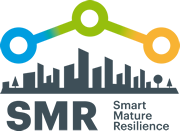Resources
PUBLICATIONS AND DOWNLOADS
Multidisciplinary Literature Synthesis
Date
Deliverable
March 2016
D1.3
Lead Partner
Linköping University
Authors
Magnus Bång, Amy Rankin (LiU)
Co-authors
Jaziar Radianti (CIEM), Johan Brage (LiU), Simon Rosenqvist (LiU), Jonas Lundberg (LiU), Josune Hernantes (Tecnun), Maider Sainz (Tecnun), Colin Eden (Strath)
Increasing resilience to crises and disasters is a topic of highest political concern worldwide. Cities and communities need methods and tools to prevent and manage the effects of natural hazards such as floods, storms, earthquakes, volcanoes and tsunamis as well as man-made threats such as accidents and terrorism. The aim of the Smart Mature Resilience project is to deliver a Resilience Management Guideline to support city decision-makers in developing and implementing resilience measures in their cities in order for the cities to form an emerging resilience backbone for Europe. The overall objective of WP1 is to obtain an overview of current practice in urban resilience and EU sectorial resilience approaches, to identify, synthesize and assess the main challenges and best practice of today.
This report is the result of the work carried out in the first, second and third tasks in WP1 of SMR. The report includes summaries of D1.1 in terms of (1) a systematic literature review of urban resilience, (2) a review of world-wide reports approaches and indicators related to urban resilience and, (3) a city survey of approaches and challenges for our SMR partner cities. The report also summarises work conducted in D1.2, specifically, (1) a systematic literature review of three problem areas (resilience in critical infrastructure (CC), climate change (CI) and social dynamics (CD)), (2) a review of EU project reports, and (3) a repository of policies, metrics and best practices.
With regards to the analysis and synthesis of resilience approaches in D1.3, the report provides a working definition on urban resilience based on reviewed literature. Moreover, the report presents the SMR City Framework (SCF) – a theoretical perspective on city resilience based on contemporary theories in Resilience Engineering. An operationalization of SCF is also provided that can direct the development of a maturity model for SMR as well as focusing design of tools, instruments and standards in the SMR project.

This project has received funding from the European Union’s Horizon 2020 research and innovation programme under grant agreement no. 653569.

